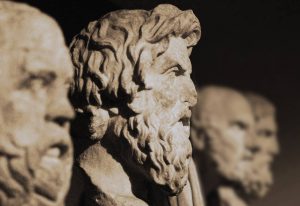
Philosophy is one of the world’s oldest academic subjects and strives to answer fundamental questions such as, What is consciousness? Who should rule? What is knowledge? What is freedom? What is beauty? What is good? What is a number? By trying to answer these questions philosophy connects with many other academic subjects, including psychology, politics, law, physics, and mathematics. This means that philosophy is by its very nature an interdisciplinary subject.
Curriculum
The curriculum for the B.A. in Philosophy at Bilkent is designed to produce graduates who are skilled problem-detectors, versatile problem-solvers and confident communicators. In other words, it aims to develop individuals who can adapt in a world characterized by rapid change.
- The curriculum is broad-based, which means that students will have the opportunity to take courses in a number of academic fields, including physics, biology, mathematics, literature, arts, history and psychology.
- In addition, students will have the opportunity to take courses that aim to develop skills for the workplace (for example, languages, statistics, computer programming and skills, summer job training).
- The philosophy courses in the curriculum provide a sufficient basis for pursuing graduate studies in philosophy and related disciplines. Those courses encompass key texts and arguments in the history of philosophy, as well as central debates in contemporary philosophy.
For a detailed description of the curriculum see the Online Catalog.
Courses
The following courses are taken from other departments:
CS 123 – Introduction to Computing and Programming for Social Sciences
MATH 105 – Introduction to Calculus I
MATH 106 – Introduction to Calculus II
ECON 103 – Principles of Economics
ENG 101 – English and Composition I
ENG 102 – English and Composition II
TURK 101 – Turkish I
TURK 102 – Turkish II
More information about these courses can be obtained from the online Bilkent catalog.
The following courses are taken from other departments:
PHYS 107 – Basic Physics I
PHYS 108 – Basic Physics II (or alternatively, MBG 110)
PSYC 100 – Introduction to Psychology
ECON 221 – Introduction to Probability and Statistics I
MBG 110 – Introduction to Modern Biology (or alternatively, PHYS 108)
HIST 200 – History of Turkey
GE 250 – Collegiate Activities Program I
GE 251 – Collegiate Activities Program II
Second Language I
Second Language II
More information about these courses can be obtained from the online Bilkent catalog.
The following philosophy courses are taken during the third year:
The following courses are taken from other departments:
Art (Restricted Elective)
Literature (Restricted Elective)
Second Language III
Second Language IV
More information about these courses can be obtained from the online Bilkent catalog.
The following philosophy courses are taken during the fourth year:
The following courses are taken from other departments:
History I (Restricted Elective)
History II (Restricted Elective)
Elective (3 electives)
More information about these courses can be obtained from the online Bilkent catalog.
This link has the most up-to-date information about the elective courses that are acceptable by the philosophy curriculum. If you are a philosophy student and need to take an elective, you must make sure that it appears in the elective lists available in this link.
More specifically, the following are the elective courses offered by our department, depending on availability of teaching staff:
